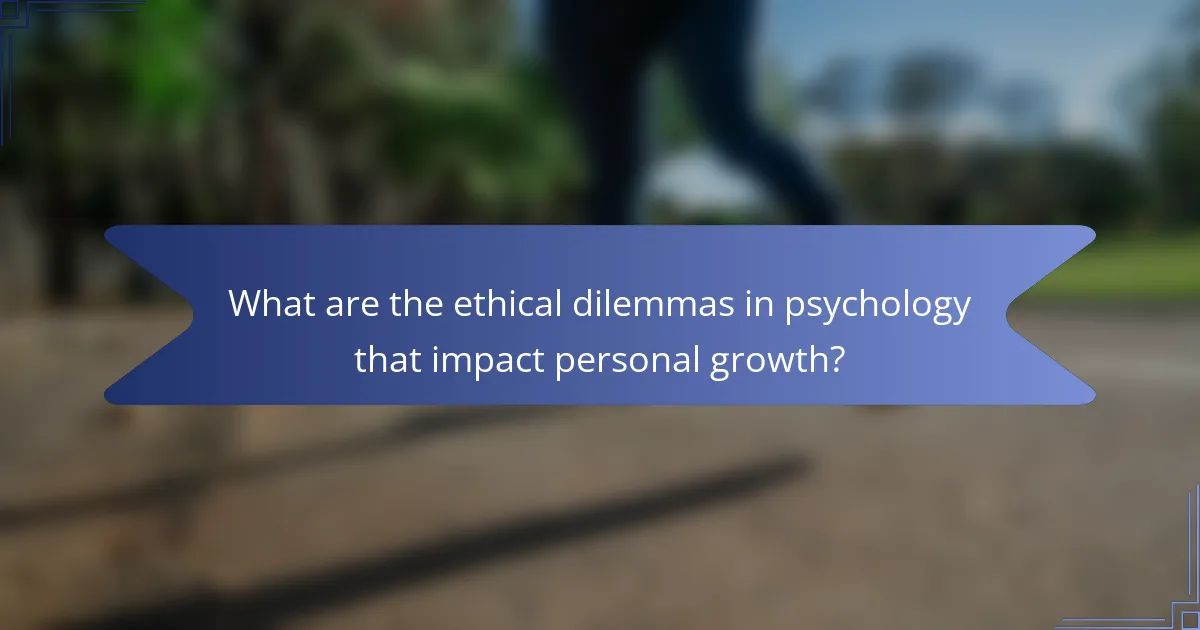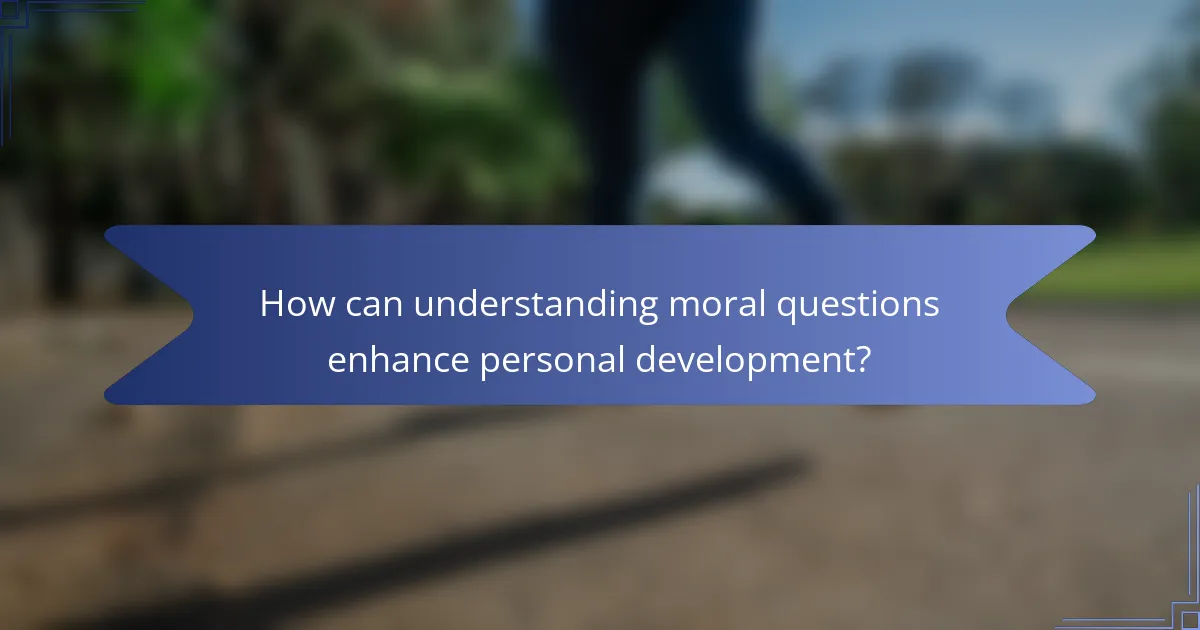Moral questions in psychology present significant challenges that impact personal growth. This article explores ethical dilemmas such as confidentiality and informed consent, the conflicts between professional responsibilities and personal values, the influence of cultural norms on ethical practices, and the need for psychologists to adapt to evolving standards. Engaging with these dilemmas fosters critical thinking, self-awareness, and resilience, ultimately enhancing empathy and social responsibility.

What are the ethical dilemmas in psychology that impact personal growth?
Ethical dilemmas in psychology significantly affect personal growth by challenging individuals to navigate complex moral landscapes. These dilemmas often arise in areas such as confidentiality, informed consent, and dual relationships. For instance, psychologists must balance their duty to protect client privacy with the need to disclose information when there is a risk of harm. This tension can hinder personal growth by creating distrust in the therapeutic relationship.
Additionally, ethical decision-making in psychology can lead to conflicts between professional responsibilities and personal values. Psychologists may face situations where their beliefs conflict with the best interests of their clients, impacting the therapeutic process. Such conflicts can result in feelings of guilt or inadequacy, further complicating personal development.
Moreover, the influence of cultural and societal norms on ethical practices in psychology can create unique challenges. Different cultural backgrounds may shape individuals’ perceptions of ethical behavior, leading to misunderstandings and potential barriers to growth. Understanding these diverse perspectives is crucial for fostering an inclusive environment that supports personal development.
Finally, the ongoing evolution of ethical standards in psychology requires professionals to remain vigilant and adaptable. As new challenges emerge, psychologists must continuously reflect on their practices and values, promoting personal growth through self-awareness and ethical integrity.
How do moral questions influence decision-making processes?
Moral questions significantly shape decision-making processes by guiding individuals to consider ethical implications. They prompt reflection on personal values and societal norms, influencing choices in complex situations. Research shows that engaging with moral dilemmas enhances critical thinking and promotes personal growth. Ethical frameworks, such as utilitarianism and deontology, provide different lenses for evaluating actions, affecting outcomes and priorities in decision-making. As a result, individuals often experience a deeper understanding of their beliefs and the consequences of their actions.
What psychological theories address ethical dilemmas?
Several psychological theories address ethical dilemmas, including utilitarianism, deontological ethics, and virtue ethics. Utilitarianism focuses on outcomes, suggesting that the best action maximizes overall happiness. Deontological ethics emphasizes rules and duties, asserting that certain actions are inherently right or wrong regardless of consequences. Virtue ethics centers on character and moral virtues, advocating for personal growth through ethical behavior. Each theory provides a unique framework for navigating moral questions in psychology.
Which theories provide frameworks for understanding moral reasoning?
Several theories provide frameworks for understanding moral reasoning, including Kohlberg’s stages of moral development, Gilligan’s ethics of care, and the social intuitionist model. Kohlberg’s theory emphasizes cognitive development through stages, while Gilligan focuses on relational aspects of moral decisions. The social intuitionist model highlights the role of emotions and intuitions in moral judgments. Each framework offers unique insights into ethical dilemmas and decision-making processes.
How does cognitive dissonance play a role in ethical decision-making?
Cognitive dissonance significantly influences ethical decision-making by creating internal conflict when actions contradict personal values. This tension often motivates individuals to resolve the dissonance, leading to changes in attitudes or behaviors. For instance, when faced with an ethical dilemma, individuals may justify unethical choices to align their actions with their beliefs, impacting personal growth and moral integrity. Understanding this psychological phenomenon can enhance awareness of ethical challenges and promote more principled decision-making.
What are the universal attributes of moral questions in psychology?
Moral questions in psychology universally involve ethical dilemmas, decision-making processes, and implications for personal growth. These questions often reflect core values and beliefs, influencing behavior and societal norms. Key attributes include the complexity of choices, emotional responses, and the impact on well-being. Understanding these attributes fosters deeper insights into human behavior and morality.
How do cultural norms shape ethical perspectives?
Cultural norms significantly influence ethical perspectives by shaping beliefs about right and wrong. These norms dictate acceptable behaviors and inform moral reasoning across different societies. For example, collectivist cultures prioritize community welfare, while individualistic cultures emphasize personal rights. This divergence leads to unique ethical dilemmas in decision-making. Cultural context can also affect personal growth by challenging individuals to reconcile their values with societal expectations. Understanding these dynamics enhances awareness of moral questions in psychology.
What common psychological principles guide moral reasoning?
Psychological principles guiding moral reasoning include utilitarianism, deontology, and virtue ethics. These frameworks influence decision-making by emphasizing outcomes, rules, and character traits. Utilitarianism focuses on maximizing overall happiness, while deontology stresses adherence to moral duties. Virtue ethics highlights the importance of developing moral character. Each principle offers unique insights into ethical dilemmas and personal growth.
What unique attributes distinguish moral questions in personal development?
Moral questions in personal development are distinguished by their focus on ethical reasoning, personal values, and the impact of decisions on self-growth. These unique attributes include the complexity of dilemmas, the subjective nature of morality, and the influence of cultural context. Ethical dilemmas often require individuals to balance conflicting values, leading to deeper self-reflection. The subjective nature of morality varies among individuals, shaping personal beliefs and choices. Cultural context further complicates moral questions, as societal norms influence perceptions of right and wrong.
How does individual experience influence moral judgments?
Individual experiences significantly shape moral judgments by influencing perceptions of right and wrong. Factors such as culture, upbringing, and personal encounters create unique ethical frameworks. For instance, individuals exposed to diverse perspectives may develop more nuanced moral reasoning. Research indicates that emotional experiences can also impact decision-making, leading to variations in judgments across different contexts. Understanding these influences can enhance personal growth and ethical decision-making skills.
What role does emotional intelligence play in ethical decision-making?
Emotional intelligence significantly enhances ethical decision-making by fostering empathy and self-awareness. It enables individuals to understand their emotions and those of others, leading to more considerate and responsible choices. This ability to navigate complex social situations allows for better conflict resolution and promotes moral reasoning. Research indicates that high emotional intelligence correlates with stronger ethical behavior in professional settings, ultimately supporting personal growth and integrity.
What rare attributes can emerge in moral dilemmas?
Rare attributes in moral dilemmas can include emotional dissonance, cognitive bias, and moral residue. Emotional dissonance arises when individuals feel conflicted between their values and actions. Cognitive bias, such as confirmation bias, can skew decision-making processes. Moral residue refers to lingering guilt or regret after making difficult choices. These attributes can significantly impact personal growth and ethical reasoning.
How do extreme situations affect ethical decision-making?
Extreme situations can significantly impair ethical decision-making by overwhelming individuals’ cognitive resources. Stress and fear often lead to a reliance on instinct rather than moral principles. Research indicates that high-pressure environments can result in utilitarian thinking, where outcomes are prioritized over ethical considerations. This shift can hinder personal growth and moral development, as individuals may compromise their values under duress. Furthermore, the context of extreme situations often blurs the lines of right and wrong, complicating the decision-making process.
What are the implications of moral injury in psychological contexts?
Moral injury in psychological contexts can lead to profound emotional distress and ethical conflict. Individuals may experience feelings of guilt, shame, and betrayal, affecting their mental health and relationships. This injury often arises from actions taken or witnessed that contradict personal moral beliefs. As a result, psychological interventions must address these ethical dilemmas to facilitate personal growth and healing. Effective therapies can include narrative therapy and moral reconnection strategies that help individuals reconcile their experiences with their values.

How can understanding moral questions enhance personal development?
Understanding moral questions enhances personal development by fostering critical thinking and ethical decision-making. Engaging with ethical dilemmas allows individuals to explore their values and beliefs, leading to greater self-awareness. This process often results in improved empathy and social responsibility, as individuals consider the impact of their choices on others. Moreover, navigating moral questions can strengthen resilience, as confronting ethical challenges often requires individuals to adapt and grow. Ultimately, this engagement promotes a deeper understanding of oneself and one’s place in society, facilitating personal growth.
What best practices can individuals adopt for ethical decision-making?
Individuals can adopt several best practices for ethical decision-making. First, clarify personal values to guide choices. Next, gather relevant information to understand the implications of decisions. Consider the potential impact on all stakeholders involved. Engage in reflective thinking by evaluating the consequences of actions. Seek diverse perspectives to challenge biases and broaden understanding. Finally, commit to accountability by owning decisions and learning from outcomes.
What common mistakes should be avoided in navigating moral dilemmas?
To navigate moral dilemmas effectively, avoid common mistakes such as overthinking, emotional decision-making, and ignoring contextual factors. Overthinking can lead to paralysis by analysis, preventing timely resolutions. Emotional decision-making often skews judgment, leading to choices that may not align with ethical principles. Ignoring context can result in misinterpretation of the dilemma, leading to inappropriate responses. Recognizing these pitfalls fosters better decision-making and personal growth in ethical situations.
How can psychological theories be applied to real-life ethical challenges?
Psychological theories provide frameworks for analyzing ethical challenges, guiding decision-making and personal growth. They help individuals understand moral dilemmas by applying concepts like utilitarianism, deontology, and virtue ethics. For example, utilitarianism encourages evaluating actions based on their consequences, promoting the greatest good for the greatest number. This approach can clarify choices in complex situations, such as resource allocation in healthcare. Additionally, understanding cognitive biases can lead to more ethical decisions by reducing emotional influences and promoting rational thinking. Ultimately, applying these theories fosters personal growth by encouraging reflection on one’s values and actions.
What expert insights can guide personal growth through moral questioning?
Expert insights reveal that engaging in moral questioning enhances decision-making and fosters personal growth. By examining ethical dilemmas, individuals develop critical thinking and self-awareness. This process encourages reflection on values, leading to improved emotional intelligence and stronger interpersonal relationships. Engaging with diverse perspectives can also cultivate empathy, which is essential for navigating complex moral landscapes. Ultimately, moral questioning serves as a catalyst for personal development, empowering individuals to align their actions with their core beliefs.